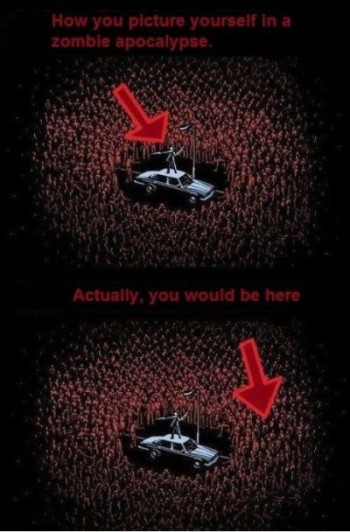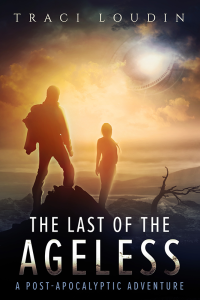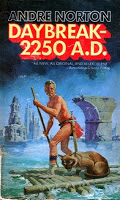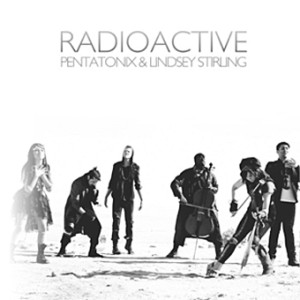I’ve loved the post-apocalyptic genre since I was a teenager. With the recent success of movies like Mad Max: Fury Road and video games like Fallout, Half-Life 2, Gears of War, and The Last of Us, I started thinking more about why we love the apocalypse.
The apocalyptic subgenre can take place in three different time periods:
The End Times
 Some apocalyptic books and movies begin before the catastrophic event that brings about the end. While there are plenty of memes about how we like to think we’ll be one of the survivors (only the strong survive, right?), I think that’s too easy of an answer.
Some apocalyptic books and movies begin before the catastrophic event that brings about the end. While there are plenty of memes about how we like to think we’ll be one of the survivors (only the strong survive, right?), I think that’s too easy of an answer.
Oftentimes, we humans fear the deaths of our loved ones far more than we fear our own deaths. That’s why we’re willing to make sacrifices, and we like to think that if faced with the terrifying notion of the end of the world, we’d do everything we could to protect those we love.
When someone dies, those left behind are the ones suffering, more than the one who departed. So in a way, the apocalypse is almost a comfort, for we all confront death together. We don’t have to face a world left with a gaping hole a loved one used to fill.
This was particularly well done in the movie Knowing.
The Apocalypse Itself
Other end of the world stories focus on the characters living through the apocalyptic event itself, like the movies Armageddon, The Day After Tomorrow, and 2012. I personally don’t find these as interesting, because they’re really just disaster flicks in disguise.
Again, I think the reason people like these so much is because we’d like to think we’d be the ones to survive. It also plays into the playacting aspect of our brains, where watching someone struggle allows us to feel better prepared for the potential of facing it ourselves. Of course, that starts to get into the overall question of why we read.
 Alien invasion stories are an entirely different breed. We love a good alien invasion because it’s an enemy we can unite against. It gives us a reason to bond with our fellow human against a common foe, and it appeals to our instinctive xenophobia and us vs. them mentality.
Alien invasion stories are an entirely different breed. We love a good alien invasion because it’s an enemy we can unite against. It gives us a reason to bond with our fellow human against a common foe, and it appeals to our instinctive xenophobia and us vs. them mentality.
Three centuries before my novel The Last of the Ageless begins, humans and aliens fought for control of the Earth, ending in an apocalyptic event known as the Catastrophe.
Rise From The Ashes
The post-apocalypse is my favorite part of the whole apocalyptic subgenre. Like the lyrics of Radioactive:
Welcome to the new age
When I was a teenager, I loved reading the James Axler series Outlanders and Deathlands. (It wasn’t until much later that I realized James Axler wasn’t one author, but many!) I must’ve watched The Postman, Waterworld, and Escape from L.A. a couple dozen times. But by far, my favorite book was Daybreak 2250 A.D. by Andre Norton.
In many cases, we fall in love with a post-apocalypse book or movie because we love survival fiction. Real-world preppers feel a sense of community by watching or reading about survivors fighting their way through a desolate wasteland or banding together against lawless foes. Many of us long for a sense of a simpler life, a time where we can return to nature, free from all the superficial, unnatural advancements of the modern age.
But I think for most of us, it’s the concept of a new age. Humanity has a fresh start, and while there will be ruthless killers running wild, people come to rely on each other more, to form tight-knit communities where everyone knows each other.
My favorite post-apocalyptic books:

- Daybreak 2250 A.D. (Star-Man’s Son) by Andre Norton
- Wastelands: Stories of the Apocalypse Anthology edited by John Joseph Adams
- Feed (Newsflesh Trilogy) by Mira Grant
- The Hunger Games Trilogy by Suzanne Collins
- The Stand by Stephen King
- Dies the Fire (Emberverse) by S.M. Stirling
- The Giver by Lois Lowry
Required reading:
- Why Do We Love The Apocalypse So Much? on The Mary Sue
- Why Do We Love The Apocalypse? on Book Riot – very similar to my notion above
- Why We Love The Apocalypse on IGN
- Psychology Reveals The Comforts Of The Apocalypse on Scientific American

Comments
4 responses to “The Seductive Nature of the Apocalypse”
I think one of the most seductive aspects of the apocalypse was captured in the Twilight Zone episode “Time Enough At Last.”
http://www.imdb.com/title/tt0734683/
If you’ve been stuck in an alternate dimension for the last fifty years, Burgess Meredith plays Henry Bemis who loves books, but his boss and his wife refuse to let him indulge in his passion. From the introduction:
“Witness Mr. Henry Bemis, a charter member in the fraternity of dreamers. A bookish little man whose passion is the printed page, but who is conspired against by a bank president and a wife and a world full of tongue-cluckers and the unrelenting hands of a clock. But in just a moment, Mr. Bemis will enter a world without bank presidents or wives or clocks or anything else. He’ll have a world all to himself…without anyone.”
I think most of us can relate to Mr. Bemis. While I love my family and friends dearly, I am very fond of the times I can spend an evening or a weekend alone without having to live my life for other people’s convenience. Even if I spend the free time doing something to benefit other people, I do it because I made the decision to do such.
I don’t believe I would last very long living by myself in a world without other people, but that hasn’t stopped me from the occasional daydream of being in a state where I can do what I want when I want to do it
I think all of us introverts feel that way, Andrea. 🙂 Apocalyptic books/movies where there’s no one else don’t really interest me, personally, because there’s no hope for a future. I didn’t like Richard Matheson’s I Am Legend, for instance. My favorites are the ones where the characters are always clinging to the cliff face trying to survive, forced to depend on each other.
OMG, I fell in love with Daybreak 2250 A.D. by Andre Norton when I was in junior high! I’ve never heard anyone else mention it before. I think I still have a copy around the house somewhere. I should read it again. ;-}
Same here, Nikki! I actually have two copies, but they’re both ultra old and falling apart. One of their spines is completely destroyed. I doubt I could re-read either of them again in their current state. I wish someone would turn it into an ebook.